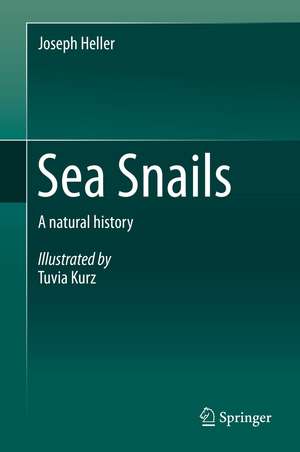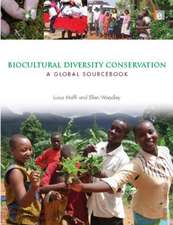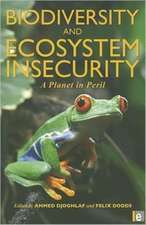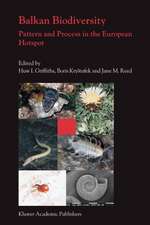Sea Snails: A natural history
Autor Joseph Helleren Limba Engleză Hardback – 24 iun 2015
| Toate formatele și edițiile | Preț | Express |
|---|---|---|
| Paperback (1) | 790.60 lei 38-45 zile | |
| Springer International Publishing – 14 oct 2016 | 790.60 lei 38-45 zile | |
| Hardback (1) | 954.14 lei 6-8 săpt. | |
| Springer International Publishing – 24 iun 2015 | 954.14 lei 6-8 săpt. |
Preț: 954.14 lei
Preț vechi: 1163.58 lei
-18% Nou
Puncte Express: 1431
Preț estimativ în valută:
182.57€ • 190.62$ • 151.10£
182.57€ • 190.62$ • 151.10£
Carte tipărită la comandă
Livrare economică 04-18 aprilie
Preluare comenzi: 021 569.72.76
Specificații
ISBN-13: 9783319154510
ISBN-10: 3319154516
Pagini: 360
Ilustrații: XIII, 354 p. 243 illus., 135 illus. in color.
Dimensiuni: 155 x 235 x 22 mm
Greutate: 0.69 kg
Ediția:2015
Editura: Springer International Publishing
Colecția Springer
Locul publicării:Cham, Switzerland
ISBN-10: 3319154516
Pagini: 360
Ilustrații: XIII, 354 p. 243 illus., 135 illus. in color.
Dimensiuni: 155 x 235 x 22 mm
Greutate: 0.69 kg
Ediția:2015
Editura: Springer International Publishing
Colecția Springer
Locul publicării:Cham, Switzerland
Public țintă
ResearchCuprins
Part I: A Back ground.- Part II: Primitive Sea Snails.- Part III: Advanced Sea Snails.- Part IV: Away from the Basic lifestyle.- Part V: Man Snail Links.
Textul de pe ultima copertă
This richly illustrated book presents the diversity and natural history of sea snail groups. By integrating aspects of morphology, ecology, evolution and behaviour, it describes how each group copes with problems of defence, locomotion, nutrition, reproduction and embryonic development. First come general characteristics of the Mollusca, to which snails belong; and next, characteristics by which snails (Gastropoda) differ from other molluscs. Then a broad, panoramic view of all major sea snail groups, from the primitive to the more advanced, is presented, including both the more abundant and some remote ones of special interest. In detailing primitive sea snails, first limpets (Patellogastropoda) are described, followed by brush snails (Vetigastropoda: top-shells, turbans and allies) and nerites (Neritimorpha), a small group with remarkably high variation in shell colour and in habitats. In looking at advanced-snails (Caenogastropoda), it details the herbivorous grazers and filter-feeders and the many voracious predators, some which use venomous darts. The book also covers sea slugs (Opisthobranchia), which have shifted from mechanical to chemical defence; some are herbivores, some use their food to harness solar energy, others are predators that gain stinging cells and poisonous compounds from their food. In addition, readers will learn about aspects of sea snails in human culture, including use as sacred artefacts and objects of magic and money, as a source of the royal and sacred dyes of purple and blue and as holy ceremonial trumpets. The text, in which scientific terms are accompanied by parallel common ones, is accompanied by over 200 illustrations (mostly in colour). This comprehensive, insightful portrait of sea snails will appeal to marine biologists, zoology lecturers and students, biology teachers, field-school instructors, nature reserve wardens, amateur naturalists, as well as to lecturers and learners of human culture.
Caracteristici
Presents a broad, panoramic view of all major sea snail groups, both the more abundant as well as remote ones of special interest
Covers all sea snail groups along with five major features of their natural history: defence, locomotion, respiration, nutrition and reproduction
Scientific terms are accompanied by parallel vernacular terms and the text is accompanied by over 200 illustrations
Covers all sea snail groups along with five major features of their natural history: defence, locomotion, respiration, nutrition and reproduction
Scientific terms are accompanied by parallel vernacular terms and the text is accompanied by over 200 illustrations













